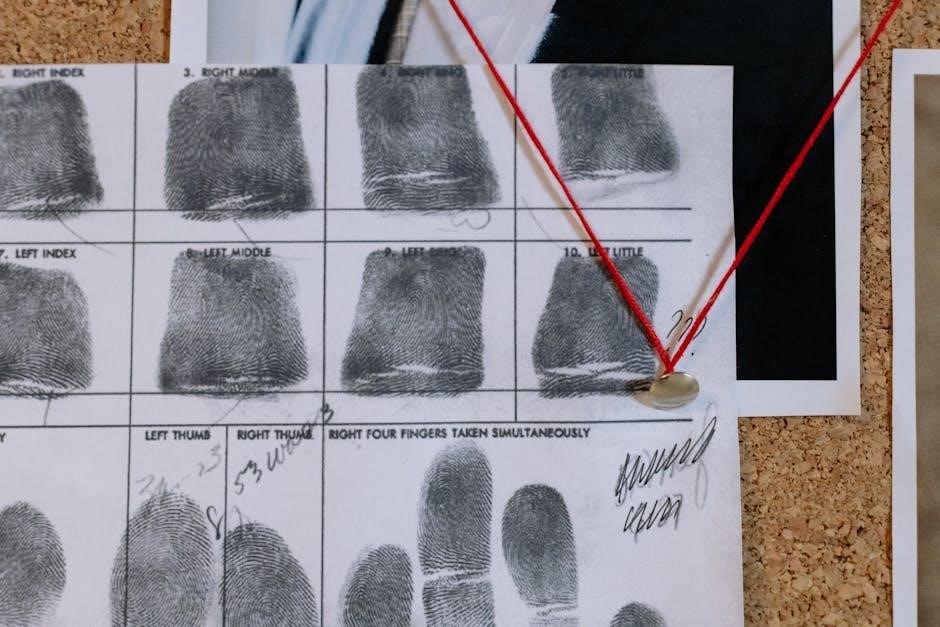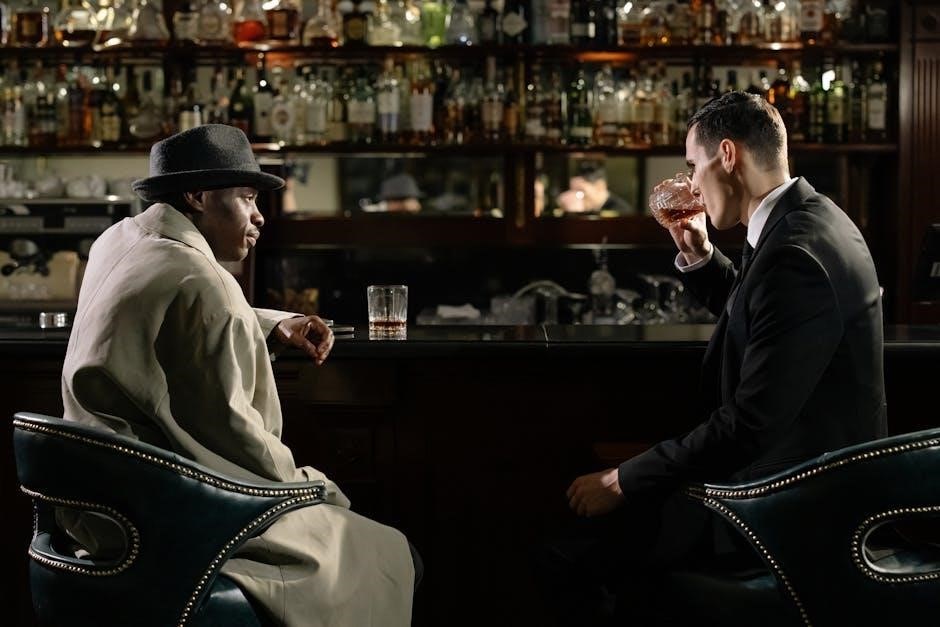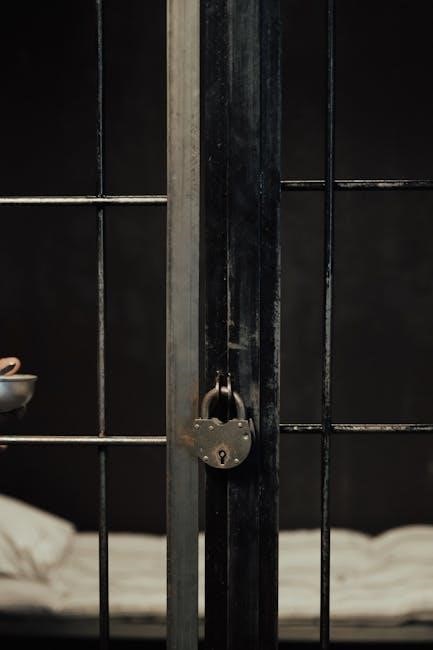Idaho Criminal Jury Instructions are carefully crafted to provide juries with clear legal frameworks, ensuring fair and informed decision-making while maintaining justice and upholding the law.
1.1 Definition and Purpose of Jury Instructions
Jury instructions are official guidelines provided to jurors in criminal trials, outlining the applicable laws, procedures, and standards for evaluating evidence. Their purpose is to ensure jurors understand their role, the legal definitions of charges, and the burden of proof. In Idaho, these instructions are designed to guide jurors in reaching impartial, informed verdicts, ensuring justice is served fairly and consistently. They are typically drafted by judges or legal experts and are available in both Word and PDF formats for easy access.
1.2 Importance of Jury Instructions in Criminal Trials
Jury instructions are critical in criminal trials as they ensure jurors apply the correct legal standards. They clarify complex laws, define key terms, and outline the burden of proof, safeguarding the defendant’s rights. In Idaho, these instructions prevent juror confusion and promote impartial verdicts. They also uphold the integrity of the judicial process, ensuring trials are conducted fairly and consistently with statutory requirements. Accurate instructions are vital for justice and public trust in the legal system.

Sources of Idaho Criminal Jury Instructions
2.1 Official Publications and Resources
Idaho Criminal Jury Instructions are officially published in Word and PDF formats, accessible via the Idaho Courts website. The ICJI includes pre-proof instructions like ICJI 100 and ICJI 103, ensuring clarity on legal standards. An All-In-One PDF file is available for each category, providing comprehensive access to instructions. These resources are essential for attorneys and judges to ensure consistency and accuracy in criminal trials.
Idaho Criminal Jury Instructions are published by the Idaho Supreme Court and available in Word and PDF formats. The ICJI includes sections like ICJI 100 and ICJI 103, detailing pre-proof instructions and reasonable doubt. Each category offers an All-In-One PDF file for convenience. These official resources are accessible via the Idaho Courts website, ensuring consistency and fairness in criminal trials. They are regularly updated to reflect legal changes, making them indispensable for judges and attorneys.
2.2 Role of the Idaho Supreme Court in Developing Instructions
The Idaho Supreme Court plays a crucial role in developing criminal jury instructions, ensuring they align with state law and judicial precedent. It reviews and approves instructions to maintain consistency and fairness. Orders such as those from August 26, 2010, highlight the court’s active involvement in updating instructions, reflecting legal changes. This oversight guarantees that jurors receive accurate and relevant guidance, promoting justice and upholding the integrity of Idaho’s legal system.

Format and Availability of Instructions
Idaho Criminal Jury Instructions are available in Word .doc and Adobe .pdf formats, ensuring accessibility. The All-In-One PDF files offer comprehensive collections for easy reference and download.
3.1 Word and PDF Formats for Jury Instructions
Idaho Criminal Jury Instructions are provided in both Word .doc and Adobe .pdf formats, ensuring flexibility for legal professionals. The Word format allows for customization, while the PDF format offers a standardized, easily shareable version. Each category of instructions includes an All-In-One PDF file for convenience. Users can download these files directly from the Idaho Courts website, facilitating efficient preparation and reference during trials.
3;2 Accessing Instructions via the Idaho Courts Website
The Idaho Courts website serves as a central resource for accessing criminal jury instructions. Users can download individual instructions in Word .doc format or view comprehensive All-In-One PDF files. The website organizes instructions by category, making it easy to navigate and locate specific documents. Additionally, right-clicking on any instruction allows users to save files directly without opening them, ensuring convenient access for legal professionals preparing for trials.

Key Components of Criminal Jury Instructions
Criminal jury instructions outline the burden of proof, presumption of innocence, and elements of offenses, ensuring jurors understand legal standards and their role in delivering just verdicts.
4.1 Burden of Proof and Presumption of Innocence
In Idaho criminal trials, jury instructions emphasize the defendant’s presumption of innocence until proven guilty. The burden of proof rests solely on the prosecution, requiring them to prove guilt beyond a reasonable doubt. This standard ensures fairness, protecting the accused from unjust convictions. Jurors are instructed to weigh evidence impartially, understanding that the state must meet this high threshold before a guilty verdict can be rendered.
4.2 Elements of Criminal Offenses and Required Jury Findings
Idaho criminal jury instructions require jurors to evaluate whether the prosecution has proven each element of the charged offense beyond a reasonable doubt. These elements are defined by statute and must be clearly outlined in the instructions. Jurors are directed to base their findings exclusively on the evidence presented and the legal definitions provided. The prosecution must prove every essential component of the crime, ensuring the jury’s decision aligns with the law and the facts presented at trial.

Legal Procedures for Requesting and Objecting to Instructions
Parties must submit proposed jury instructions within deadlines set by court rules, allowing time for review and objection before trial.
5.1 Deadlines for Submitting Jury Instructions
Under Idaho law, parties must submit proposed jury instructions within specific deadlines set by court rules. These deadlines ensure timely review and preparation. Failure to meet deadlines may result in instructions being deemed waived. For criminal trials, instructions are typically submitted before evidence presentation, with final versions provided before closing arguments. Adherence to these timelines is crucial for maintaining procedural integrity and ensuring a fair trial. Rule 30 of the Idaho Criminal Rules governs this process.
5.2 Process for Objecting to Proposed Instructions
In Idaho criminal trials, objections to proposed jury instructions must be made in writing and submitted to the court before the instructions are finalized. Parties must specify the grounds for objection, ensuring clarity and relevance. The court reviews objections, and if deemed valid, may modify or exclude the contested instructions. A hearing may be held to address disputes, with the court ultimately deciding whether to sustain or overrule the objections. Rule 30 of the Idaho Criminal Rules governs this procedural requirement.

Delivery of Jury Instructions in Criminal Trials
Jury instructions in Idaho criminal trials are delivered at specific stages, ensuring clarity and understanding. Instructions are provided before and after evidence presentation, guiding jurors effectively.
6.1 Pre-Proof and Post-Proof Instructions
In Idaho criminal trials, pre-proof instructions are provided to jurors before evidence is presented, outlining roles and basic legal principles. These instructions ensure jurors understand their responsibilities and the trial’s framework. Post-proof instructions, given after all evidence is presented, detail specific laws applicable to the case, such as the burden of proof and elements of crimes; Both stages ensure jurors are well-informed, promoting fair and impartial decisions. Judges carefully deliver these instructions to guide jurors effectively throughout the trial process.
6.2 Communicating Instructions to the Jury
In Idaho criminal trials, judges deliver jury instructions orally and provide written copies to ensure clarity. This dual approach helps jurors understand complex legal concepts. Instructions are read aloud at critical stages, such as after evidence presentation and before deliberation. Jurors can refer to written instructions during discussions, ensuring accurate application of the law. This method promotes transparency and aids jurors in reaching informed, lawful verdicts, maintaining the integrity of the judicial process.

Notable Cases and Their Impact on Jury Instructions
High-profile criminal cases in Idaho, such as those involving hate crimes, have influenced the refinement of jury instructions, ensuring clarity and fairness in legal proceedings.
7.1 High-Profile Criminal Cases in Idaho
A notable case involved five members of the Patriot Front group convicted of misdemeanor conspiracy to riot at a Pride event in Kootenai County. This case highlighted the importance of clear jury instructions in hate crime prosecutions, ensuring jurors understood the legal definitions of conspiracy and rioting. The verdict underscored the role of jury instructions in addressing complex social issues and maintaining public trust in the judicial process.
7.2 Evolution of Jury Instructions Based on Case Law
The Idaho Supreme Court regularly reviews and updates criminal jury instructions to reflect evolving case law and legal standards. Recent updates include clarifications on conspiracy charges and hate crimes, influenced by high-profile cases like the Patriot Front convictions. These revisions ensure instructions remain accurate and aligned with judicial precedents, providing jurors with clear guidance to apply the law effectively in complex and sensitive cases.

Challenges and Controversies Surrounding Jury Instructions
Clarity and bias concerns often arise with jury instructions, as complex legal language may confuse jurors, potentially leading to unfair outcomes in criminal trials.
8.1 Clarity and Complexity of Instructions for Jurors
Ensuring jury instructions are clear and understandable is a significant challenge. Complex legal terminology often complicates jurors’ ability to grasp key concepts. While Idaho provides instructions in Word and PDF formats, the language may still be daunting for laypersons. Courts strive to simplify instructions without losing legal precision, but the balance remains a critical issue. Clear communication is essential to prevent misunderstandings that could impact trial outcomes.
8.2 Potential for Bias in Instruction Wording
The wording of jury instructions can inadvertently introduce bias, influencing jurors’ perceptions. Precise language is critical to avoid misinterpretation. Idaho Criminal Jury Instructions are carefully reviewed to ensure neutrality, but the complexity of legal terminology can still pose challenges. The Idaho Supreme Court oversees instruction development to minimize bias, yet the phrasing of certain instructions may inadvertently sway opinions. Addressing this issue requires ongoing refinement to maintain fairness and impartiality in criminal trials.

Best Practices for Drafting and Presenting Instructions
Utilize clear, concise language in jury instructions to ensure juror understanding. Collaborate with judges and attorneys to refine content, ensuring accuracy and compliance with Idaho legal standards.
9.1 Ensuring Accuracy and Relevance
Accurate jury instructions are critical to fair trials. Ensure instructions align with current Idaho statutes and case law. Use clear, precise language to avoid juror confusion. Relevance is key—tailor instructions to the specific case facts and legal issues. Avoid including unnecessary or misleading information. Regularly update instructions to reflect legal changes. Utilize resources like the Idaho Supreme Court’s official publications to maintain reliability. Legal experts should review instructions to confirm accuracy and ensure compliance with Idaho’s judicial standards.
9.2 Collaborative Efforts Between Judges and Attorneys
Collaboration between judges and attorneys is essential for effective jury instructions. Judges and attorneys often work together to draft and refine instructions, ensuring clarity and legal accuracy. This teamwork helps tailor instructions to the case’s specific facts and legal issues. Attorneys may submit proposed instructions, while judges review and finalize them. Open communication ensures instructions are comprehensive and fair, promoting consistency in Idaho courts. This collaborative approach strengthens the judicial process and upholds the integrity of criminal trials.
Idaho Criminal Jury Instructions play a vital role in upholding justice by ensuring clarity and fairness. Their continuous refinement supports the evolving legal landscape and trial integrity.
10.1 The Role of Jury Instructions in Ensuring Justice
Jury instructions are pivotal in criminal trials, serving as the foundation for fair decision-making. They ensure jurors understand the law, the burden of proof, and the defendant’s rights, safeguarding justice and upholding the legal system’s integrity. By providing clear guidelines, these instructions help jurors reach impartial verdicts based on evidence, ensuring that trials remain equitable and just. This underscores their critical role in maintaining the rule of law and protecting individual freedoms in Idaho’s criminal justice system.
10.2 Future Developments in Idaho Criminal Jury Instructions
Future developments in Idaho criminal jury instructions aim to enhance clarity and accessibility, ensuring jurors understand complex legal concepts. Technological advancements, such as digital formats and interactive tools, may improve how instructions are delivered. The Idaho Supreme Court is expected to continue refining the ICJI to reflect evolving case law and legal standards. These updates will focus on maintaining fairness, accuracy, and transparency, ensuring justice is served effectively in criminal trials across the state.